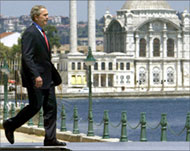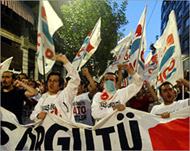NATO summit ends amid rift
A major spat between France and the US, an appeal by Afghan President Hamid Karzai for more aid and an explosion on a Turkish airliner marked the end of an eventful NATO summit in Istanbul on Tuesday afternoon.

Earlier, anti-summit activists had continued their fight to reach the summit’s conference centre, with police shooting live rounds over their heads in the city’s central Taksim Square.
Out of the protesters’ sight, visiting US President George Bush praised Turkey as living proof that the clash of civilisations theory was nothing but a myth – before boarding his plane not 200m from where a bomb had exploded a few hours before.
The device was accidentally discovered by cleaners on board a Turkish Airlines plane from Izmir that was being readied for departure to a European city. At least two people were injured in the blast.
It was a strange end to a conference that had seen NATO pledge greater support for the Afghan and Iraqi governments.
Frontline state
Earlier, France made clear its discomfort with plans for NATO to train Iraqi security forces, while it also accused the US of interfering in European Union affairs.
 |
|
Turkey got strong support from |
This came after Washington had made strident calls for Turkey to be given a date for membership of the European club. Turkey has been pushing to join the EU for decades, and this December EU leaders are set to take a decision on whether or not to give Turkey a date for starting membership talks.
Yet this final Franco-US spat highlighted one other thing too: how Turkey‘s role at the conference has been far more than just that of host. The country features in just about every NATO theatre of operations these days – and may feature strongly in future ones as well.
“Turkey now has the part Germany played in the old NATO,” said Iltar Turan of Istanbul‘s Bilgi University. “Germany was the frontline state in the days of the Cold War, as it faced the main Soviet threat.
“Now, the challenges NATO faces are more elusive – terrorism, ethnic conflict, drug trafficking and instability – and Turkey is the borderland for these. It is the new frontline state for these new challenges.”
Rising profile
Turkey has taken an important role in NATO troop deployments in Afghanistan, Bosnia, Kosovo and Macedonia. Now many are asking whether it will take more of a role in Iraq – after NATO agreed to provide training for Iraqi security forces.
Turkish Foreign Minister Abdullah Gul said on Monday that Turkey would “consider” any request on this subject made by the Iraqi interim government, while the following day, Prime Minister Recip Tayyip Erdogan said there had been “no decision yet” on the issue. However, both ruled out any deployment of Turkish combat troops in the country.
 |
|
Erdogan is under US pressure to |
“Turkey would be interested in providing help,” said professor Turan. “But what form this may take is not known. It might be training for the police or military, and might take place inside or outside Iraq. Whichever, I wouldn’t be surprised if there was some Turkish involvement in this project.”
This may not go down well with ordinary Turks however, who have strongly opposed any participation in Iraq.
“Turkey has placed itself in a better position than ever to affect regional developments,” said the respected commentator and journalist Fehmi Koru.
“And this is because it has taken a steadfast position on Iraq – it rejected the deployment of US troops for the invasion last year and has not sent its own. Turkey has become more neutral toward Iraq and this has boosted respect for the country in the region.”
That may be lost if Turkish soldiers start deploying in Iraq – even just as trainers.
Afghan assignment
On the other hand, Turkey already has a major role in the NATO operation in Afghanistan, where the alliance’s most senior civilian representative, Hikmet Cetin, is a Turk. Turkey has also led the International Stabilisation Force (ISAF) and has deployed troops in the country.
At the NATO summit, the allies agreed to boost ISAF’s numbers from 6500 to 10,000 soldiers ahead of elections due in September.
“Turkey will probably be part of this troop enlargement,” predicts Turan.
 |
|
Most Turks oppose closer |
This will likely be welcomed by Karzai’s government, though the Afghan leader has also expressed reservations about the size of the increase. Kabul had wanted considerably more soldiers.
Turkey is also a major contributor to NATO operations in Bosnia Herzegovina and Kosovo. Although not an EU member, its forces in Bosnia will likely be asked to stay on when control of this operation is switched from NATO to the EU later this year.
The Istanbul conference may have been most useful to Turkey in terms of its efforts to join the European Union.
“The summit created a positive approach to our membership,” Turkish Prime Minister Erdogan said at the end of the NATO meeting.
He also noted that the Greek government was “giving its support” to Turkey‘s EU bid, while Bush’s enthusiasm, which had led to French criticism, was due to the US leader’s “goodwill”.
Mixed dividends
Yet, when it comes to the other major announcement of the summit – an initiative to develop dialogue between NATO and the countries of the Middle East – Turks are more sceptical.
Known as the Istanbul Cooperation Initiative, its details remain vague, yet it seems similar to the US-inspired Greater Middle East Initiative, which has drawn widespread criticism throughout the Arab world.
“If Turkey acts along with European powers and the US to impose a project of modernisation on the Middle East, it will be regarded very badly by the countries of the region,” said Koru.
|
“Turkey now has the part Germany played in the old NATO. The challenges NATO faces are more elusive – terrorism, ethnic conflict, drug trafficking and instability – and Turkey is the borderland for these”
Iltar Turan, professor, |
“I’m sure Turkey wouldn’t want to do anything to harm this standing.”
However this turns out, hundreds of workers and technicians have now started to dismantle the hi-tech conference centre structure – and an even larger army of delegates and journalists have started to head home.
Meanwhile, most Istanbulis seem simply relieved they
are going.
Corner-store owner Ali Kavratoglu said: “When I saw on TV Bush’s plane take off from Istanbul, I said to myself, ‘Thank God, he’s gone. Now maybe we can get on with our lives’.”